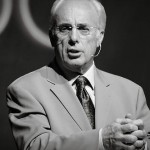 Sam Storms, Oklahoma City, Oklahoma, in an article entitled “Tornadoes and the Mystery of Suffering and Sovereignty” wrote this yesterday:
Sam Storms, Oklahoma City, Oklahoma, in an article entitled “Tornadoes and the Mystery of Suffering and Sovereignty” wrote this yesterday:
I’m inclined to think the best way to respond to the tragedy that struck our community today is simply to say nothing. I have little patience for those who feel the need to theologize about such events, as if anyone possessed sufficient wisdom to discern God’s purpose. On the other hand, people will inevitably ask questions and are looking for encouragement and comfort. So how best do we love and pastor those who have suffered so terribly?
I’m not certain I have the answer to that question, and I write the following with considerable hesitation. I can only pray that what I say is grounded in God’s Word and is received in the spirit in which it is intended.
Justin Taylor outlined his seven observations this way:
(1) It will not accomplish anything good to deny what Scripture so clearly asserts, that God is absolutely sovereign over all of nature.
(2) God is sovereign, not Satan.
(3) Great natural disasters such as this tell us nothing about the comparative sinfulness of those who are its victims.
(4) Events such as this should remind us that no place on earth is safe and that we will all one day die (unless Jesus returns first).
(5) We should not look upon such events and conclude that the Second Coming of Christ and the end of history are at hand, but neither should we conclude that the Second Coming of Christ and the end of history are not at hand.
(6) We must learn to weep with those who weep.
(7) Pray that God will use such an event to open the hearts and eyes of a city and a state immersed in unbelief and idolatry (and I have in mind not merely Oklahoma, but also America as a whole), to see the gospel of the Lord Jesus Christ and turn in faith to him, lest something infinitely worse than a tornado befall them: Eternal condemnation. Eternal suffering.
You can read the whole short article by Sam Storms here. And pray.

 “Is a trumpet blown in a city, and the people are not afraid? Does disaster come to a city, unless the Lord has done it?” – Amos 3:6
“Is a trumpet blown in a city, and the people are not afraid? Does disaster come to a city, unless the Lord has done it?” – Amos 3:6